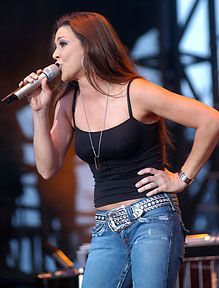
Country singer Gretchen Wilson was arrested Tuesday night at a Connecticut airport after she caused a “minor disturbance” on a flight and became “belligerent” toward troopers, police said.
Cops caught up with Wilson just after 7 p.m. when the plane she was on touched down at Bradley International Airport, the Hartford Courant reported. Connecticut State Police troopers were called to the scene after receiving a report about a “minor disturbance” on the flight.
According to TMZ, the singer reportedly got into a fight with another passenger over the bathroom on a flight. A source told the gossip site that Wilson, 45, got into a shoving match with another passenger after they exchanged words over using the airplane bathroom. The country singer reportedly waited and knocked on the door of the bathroom before the incident.
Wilson and the passenger continued to “exchange threatening hand gestures” for the rest of the 80-minute flight, sources told the site.
When the singer got off the plane, she encountered the cops waiting for her and demanded them to arrest her. “While interviewing the accused on the jetway, she [Wilson] became belligerent toward the troopers and caused a disturbance,” the police report stated. Wilson was taken into custody and charged with breach of peace. Her bail was set to $1,000 and she’s expected to appear in court this week.
This isn’t the first time the singer got entangled in an ordeal on a plane. Wilson received an in-flight citation in October 2007 when she cursed out the American Airlines flight attendants for asking her to put her dog back into a traveling case, according to TMZ.
Wilson, who lives in Lebanon, Tenn., rose to fame with her 2004 Grammy-winning country song, “Redneck Woman.” Her other hits include “All Jacked Up” and “One of the Boys.” She’s had 13 singles on Billboard’s country chart, five of which reached the Top Ten.
A quick online search of almost any celebrity will reveal a litany of stories and images – from red carpet appearances to what they eat for breakfast. These may have been published and shared by thousands of people.
The media interest in publishing such stories and images is clear, but digital technology means that celebrities’ personal and professional lives are now scrutinised more than ever before. This poses the question: do celebrities have a right to privacy, and if so, how far are we going to protect it?
Privacy and Public Interest is a balancing act. The Human Rights Convention guarantees everyone’s right to privacy, as well as their right to free expression. Since the Human Rights Act came into force in 2000, people have been able to assert these rights before the courts. However, both rights are qualified (or restricted) rights – meaning they can be limited in certain situations. For example, if a story is in the public interest, a judge may rule that the celebrity’s right to privacy should be limited for the greater purpose of informing the public.
In the case of celebrity stories or photographs, Articles 8 (privacy) and 10 (expression) often come into conflict. The rights to privacy and free expression are of equal importance legally, so it can be a challenge to strike a balance between them.
The Dilemma – unlike private citizens, celebrities need to attract media attention in order to promote their work – perhaps their latest film or record release. This leads people, and often newspapers, to question whether they are in any position to criticise the media attention that surrounds them. JK Rowling has described a common attitude of “you’re famous, you’re asking for it.”
An example is found in the case concerning the actors Michael Douglas and Catherine Zeta-Jones. The couple had sold the exclusive right to publish their wedding photos to OK! Magazine. However, Hello! Magazine had secretly obtained photos and published them first.
Because the couple had sold the rights to publish photos, this presented a tension in asserting their right to privacy before the courts. At the UK High Court, Mr Justice Lindsay ruled that the intrusion on their privacy was not justified. However, in a blow to right to privacy campaigners, he stressed that his ruling was based on the grounds of commercial confidentiality, not the right to privacy.
The new and real problem may no longer lie with just newspaper editors, but with private individuals online as well.
Human rights are just that – they apply to us all. The question today is not whether celebrities have a right to privacy, but how the balance should be struck between privacy and free expression. Social media has given us an even greater platform to exercise our freedom of expression, but our article 8 right to privacy remains just as important.
The press argues that it needs minimal regulation to enable it to expose wrongdoing and hypocrisy, but those appearing have said that freedom of speech has been seen as a green light to report anything, so long as it boosts sales.
Back to the story of Gretchen Wilson’s latest incident. On the one hand it is important for the public to know a little more about her character off stage in the interest of a free press society, but when the motivation is to boost sales or slander a celebrity, they have crossed the line.
I guess the bottom line, with the immediate access to personal information in today’s world, is to be the first one to point out and disclose your own “skeletons” before the press can embellish them. I have never met anyone who doesn’t have at least a few skeletons in their closest, but it completes the story when we can add “that was yesterday, I am sorry and have changed.” It’s hard to argue that 😊

